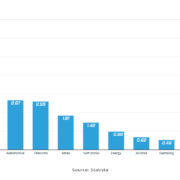The way fans consumed content in the past was predominantly unidirectional, i.e., watching live sports on traditional TV channels broadcasted by third parties, without the fan directly interacting with the right holders. This approach missed a big opportunity, as they did not have any data on how fans were reacting to their product and how they could reach new audiences. As mentioned during the 2020 Future of Sports Summit, 25% of millennials are unreachable by traditional media. A direct-to-consumer (D2C) strategy allows organizations to create a bi-directional experience by gathering data from the fans and creating a direct relationship with them, thus removing their dependence on third party service providers.
A D2C strategy allows sports organizations to create a 360º view of their fans by collecting data of their interactions and spending behaviors. They can then be targeted with relevant products and offers using AI prediction tools. Sports organizations can test new content formats or tech features with specific audiences without disrupting their current services. In addition, those sports organizations that adopt a D2C strategy will be able to provide their fans with greater freedom, choice, and flexibility in terms of the content they want. In 2020, the NBA collaborated with Microsoft to develop a personalized D2C streaming platform that includes features like full access to archived content, real-time stat overlays, social media integration, and live in-game chats with basketball influencers. This move was a step towards creating a fan ecosystem and maximizing revenues through personalized experiences.
How to drive revenue with a D2C strategy?
1. By owning the e-commerce shop
Owning an e-commerce shop presents great opportunities for sports organizations to build direct relationships with their fans. An e-commerce shop allows customers to buy products online directly from the organization’s official web store or mobile application, thus creating first-party data of their fans and cutting out third-party wholesale retailers. This means higher margins for the organization and a quicker time to market. Even though it increases the operational strain on the organization, it allows it to better control the data value chain. In 2020, FC Barcelona cut cords with Nike, who previously owned their merchandising rights, and created a proprietary e-commerce shop to bring customers closer to the club and increase profitability. Regardless, Nike themselves have been pushing toward increasing their D2C sales. According to Statista, in 2021, around $16.4 billion were generated via Nike’s direct sales channel, which includes Nike-owned retail stores and digital platforms, as compared to $2.88 billion in 2011. Other organizations like Adidas are also planning for D2C to make up 50% of its sales by 2025.
For sports organizations, owning their e-commerce shop is a great way to capture customer data. The use of digital solutions can allow sports organizations to have greater control over the customers’ online behavioral data and use that data to identify pain points in the buying experience. For instance, Decathlon Singapore analyzes the customers’ preferences as they browse and returns search results based on their gender and preferred sports. It makes the customer feel special and saves time on unnecessary browsing. Customers who are already in the database of the organization can be retained by analyzing their preferences and recommending personalized promotions on new products which they might have previously shown interest in.
It is important to focus on a set of core customers, as keeping a customer costs up to five times less than acquiring a new one, as per Mckinsey. Loyalty programs provide high retention benefits in a D2C strategy. It can reward customers with loyalty points for reaching certain milestones. In 2021, Arsenal FC started their rewards program, called “My Arsenal Rewards”, which rewards points for making purchases at the club’s online and physical retail stores. These points can be redeemed for a chance to play on the pitch at Arsenal’s Emirates Stadium or watch a game in the new dedicated My Arsenal Rewards hospitality box.
2. By monetizing your content
As younger and more tech-savvy audiences join the sports fanbase, viewership and engagement are shifting online. Sports organizations are expanding their digital offerings and personalizing content through OTT platforms. According to Grabyo research, 79% of fans globally are ready to switch to streaming platforms for live sports. The majority of sports organizations that operate an OTT platform offer a premium subscription service that guarantees fixed revenues. Amazon Prime, F1TV, and ESPN+ are some of the live streaming players who buy media rights and focus on providing high quality content and ease of navigation for maximum viewership. Some OTT platforms, like the NBA League Pass, go beyond the traditional personalization offerings and have added features like dual or quad views using selected camera angles, and micropayments for a single game or partial games. OTT platforms are also beneficial for smaller sports organizations to generate extra income. The European Professional Club Rugby (EPCR) created an OTT platform with StreamAMG to reach audiences in regions where rights have not been picked by traditional broadcasters. This strategy is inexpensive, has a low cost of content distribution, and allows data capture in new markets.
As per Nielsen Sports, the number of social media followers of the top 20 global sports organizations increased by an average of 45% from January 2019 to March 2021. This was partly due to the increasing number of fans turning to social media for sports content during the pandemic. To keep up with the growing demand, organizations increased their volume of published content and also started monetizing their content. For instance, Facebook offers D2C features like Facebook shops, in-app purchases, the ability to host live shopping experiences, and branded content solutions that can help monetize content in a personalized manner. From March 2020 to August 2021, there was a 95% increase in branded content volume across Europe’s top football club pages. They drove over 150 million euros of branded content media value just on Facebook & Instagram, as per the Leadersinsport. Organizations like FC Barcelona completely shifted their digital offerings by packaging their existing social media content and offering content inventory packages to their partners with different media valuations. Some organizations like The European Tour utilized the Facebook Creative Shop to drive up ticket sales at a 22% lower CPA.
WHAT’S N3XT?
In an industry where the fan is at the center of everything, a D2C strategy is bound to flourish and serve a variety of changing audiences. According to Statista’s 2020/21 report, over 50% of kids aged 5-7 play online games, while that number climbs to 78% for children aged 8-11 and 80% for those between 12 and 15. Gaming and Esports can be a great entry point to generate revenues from Gen Z audiences. Social media will be at the forefront of content monetization as more branded content and personalized advertising solutions are introduced by platforms like Snapchat and Tiktok.
 D2C is not about OTT or e-commerce shop ownership alone. It is also about shifting your organization’s goals towards creating deeper personalized relationships with the fans to reap long-term benefits. Content will play a key role in implementing a D2C strategy as it allows organizations to have a greater insight into their fans and their preferences. The challenge here will be how these organizations collect, manage, and use their fan data to deliver personalized, curated, and focused content on multiple screens.
D2C is not about OTT or e-commerce shop ownership alone. It is also about shifting your organization’s goals towards creating deeper personalized relationships with the fans to reap long-term benefits. Content will play a key role in implementing a D2C strategy as it allows organizations to have a greater insight into their fans and their preferences. The challenge here will be how these organizations collect, manage, and use their fan data to deliver personalized, curated, and focused content on multiple screens.
At N3XT Sports, we help sports organizations find the right digital solutions to develop and implement a D2C strategy. After an initial digital assessment of the organization, we formulate a digital transformation plan then aid in the implementation, accompanying the client throughout the transformation journey.
Fill out the form below to know more and we will get in touch with you!



